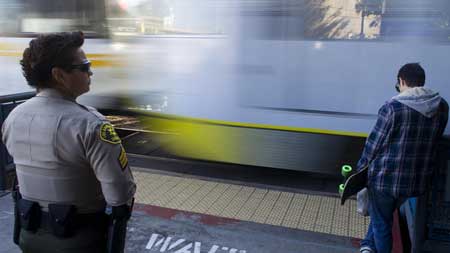 |
|
In a new survey, about 20% of passengers reported feeling unsafe due to sexual harassment or other "unwanted sexual attention." |
|
One in five passengers on Metro trains and buses have recently felt unsafe due to sexual harassment or other forms of "unwanted sexual attention," according to new data. A Los Angeles County Metropolitan Transportation Authority survey of nearly 20,000 passengers on the sprawling bus and rail system asked whether they felt unsafe during the last month while riding Metro due to "unwanted touching, exposure, comments, or any other form of unwanted sexual behavior." Traditionally, sexual harassment has been portrayed as more of a female issue. It affects everyone.- Metro employee Jeff Boberg About 21% of rail passengers and 18% of bus passengers said yes. About 17% of bus riders and 13% of train riders said they felt unsafe while waiting at bus stops or train stations. "This is something that we’re going to look at very carefully," Metro spokesman Paul Gonzales said. Metro typically asks about safety in its customer surveys, which the agency has conducted at least once a year for more than a decade. But this is the first time passengers have been asked about sexual behavior, said Jeff Boberg, an agency transportation manager who works with data and research. Metro employees distribute paper surveys, printed in English and Spanish, on every transit line at least once every six months, Boberg said. Translations in nine other languages are available online for the 5% of Metro riders who do not speak English or Spanish. The sexual harassment question was prompted, in part, by a national discussion about safety on public transit that followed a fatal gang rape on a New Delhi bus in 2012, Boberg said. A study by London's transit agency the following year found that 15% of women riding transit there had experienced "unwanted sexual behavior," but 90% of them had not reported it,according to the Guardian. Metro staff members who read stories online about such data realized they had very little comparable information, Boberg said, and decided to add the question to the most recent passenger survey. He added that Los Angles Mayor Eric Garcetti and his transportation staff also indicated they were interested. One of the biggest surprises in the data was that men reported feeling unsafe because of sexual behavior nearly as often as women, Boberg said. About 18% of women felt unsafe, as opposed to 16% of men. "Traditionally, sexual harassment has been portrayed as more of a female issue," Boberg said. "It affects everyone." Gonzales said uniformed deputies from the Los Angeles County Sheriff's Department, which patrols the Metro system, have begun boarding buses more frequently in recent weeks. "They're ostensibly there to perform fare inspections, but whenever a uniformed deputy is on board, it enhances safety in all respects," Gonzales said. |
最新調查表明,大約20%的地鐵和公交乘客表示因為性騷擾和其它“討厭的性關注”感覺不安全。 洛杉磯縣大都會運輸局調查了將近2萬公交和地鐵乘客,詢問在上個月乘坐地鐵時,是否會因為“不必要的觸摸,暴露,評論或者其他形式討厭的性行為”而感到不安全。 傳統上,性騷擾更多的是被描述為女性問題。但地鐵員工杰夫·伯貝格表示它影響著每一個人。 約21%的地鐵乘客和18%的公交乘客同意此觀點。約17%的公交乘客和13%的地鐵乘客說他們在公車站和地鐵站等車的時候覺得不安全。 地鐵發言人保羅·岡薩雷斯說道:“這是我們需要仔細注意的事。” 從事數據和研究的運輸經理杰夫·伯貝格提到,消費者在地鐵調查中常被問到安全問題,機構每年至少進行一次調查,且超過10年之久。但是這是第一次乘客被問道關于性行為的問題。 伯貝格還說,在每條運輸路線上,至少每六個月,地鐵員工會分發印刷成英語和西班牙語的調查問卷。其他九種語言版本會在網上提供給5%不會說英語和西班牙語的地鐵乘客。 他表示,性騷擾問題被提出,一定程度上是因為2012年發生在新德里公交車上的一起致命輪奸案引起了國家對于在公共交通線上安全問題的討論。《衛報》顯示,第二年,倫敦公交公司調查發現15%的女性在公交上遇到“討厭的性行為”,但是90%的人不會上報。 地鐵員工在網上看到這些情況和數據后意識到他們沒有什么可供對比的信息,伯貝格說道。他決定將這個問題加入到最近的乘客調查中。他補充道,洛杉磯市長艾瑞克·賈西提和運輸部其他員工也表示對這個問題感興趣。 數據中最令人驚奇的是男人因為性行為覺得不安全數接近女性,伯貝格說,大約18%的女性感到不安全,而男性也達到16%。 “傳統上,性騷擾更多的被描述為女性問題,”伯貝格說,“它影響著每個人。” 岡薩雷斯說道,來自洛杉磯警察局警員在最近幾周內已經開始頻繁登車巡查。他們表面上執行車票檢查,但只要有穿制服的警察在車上都會提高一定安全性。 (譯者 陳佳雨 編輯 Julie) 掃一掃,關注微博微信
  |
